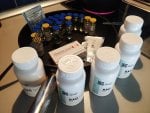this game is not for the weak mindedso I'm afraid to use this shit, run with how much mg per week?
EQ/trembo/nandrolone destroys your serotonin levels, its fact.
and because of the long ester it takes around two months for "clean" your body/mind with this
Similar threads
Similar threads
-
Approved NapsGear POTW - Boldenone 300 is on 50% Off
- Started by Richard Brown
- Replies: 17
-
Video Equipoise (Boldenone) Vs. Deca Durabolin (Nandrolone): A new video by Dylan Gemelli
- Started by dylangemelli
- Replies: 17
-
-
improper use of trenbolone causes long term effects?
- Started by Boiweji
- Replies: 20
-
-
-
using some test cyp along with primo for mild effects, add oral?
- Started by Ceusiwel
- Replies: 21
-
-
-
Podcast Evolutionary.org 603 - [2024] Trenbolone Side Effects and Cardarine (GW-501516)
- Started by JimAbs43
- Replies: 19
-
Mk677 How do i combat the negative effects on glucose/insulin sensitivity?
- Started by jj210tx
- Replies: 26
-
-
Video TRT Disappointments: Side Effects and Treatment Failures Revealed
- Started by dylangemelli
- Replies: 17
-
Video Steroid doses, side effects and results are subjective to the person using them! A new video by Dylan Gemelli
- Started by dylangemelli
- Replies: 17
-
-
-
Video Trenbolone and mental health side effects: A new video by Dylan Gemelli
- Started by dylangemelli
- Replies: 19
-
-
-
-
Evolutionary.org 516 - Peptides - Insulin Doses,Cycles,Benefits,Side Effects
- Started by JimAbs43
- Replies: 15
-
Evolutionary.org 515 - Peptides - Ace-031 Doses,Cycles,Benefits,Side Effects
- Started by JimAbs43
- Replies: 17
-
Evolutionary.org 514 - Peptides - AICAR Doses,Cycles,Benefits,Side Effects
- Started by JimAbs43
- Replies: 16
-
-
Evolutionary.org 513 - Peptides - HGH Fragment 176-191 Doses,Cycles,Benefits,Side Effects
- Started by JimAbs43
- Replies: 17
-
Evolutionary.org 512 - Peptides - Melanotan II (M2) Doses,Cycles,Benefits,Side Effects
- Started by JimAbs43
- Replies: 17
-
Evolutionary.org 511 - Peptides - TB500 Doses,Cycles,Benefits,Side Effects
- Started by JimAbs43
- Replies: 15
-
Evolutionary.org 510 - Peptides - Sermorelin (GRF 1-29) Doses,Cycles,Benefits,Side Effects
- Started by JimAbs43
- Replies: 17
-
Evolutionary.org 509 - Peptides - CJC-1295 Doses,Cycles,Benefits,Side Effects
- Started by JimAbs43
- Replies: 16
-
Evolutionary.org 508 - Peptides - GHRP-2 Doses,Cycles,Benefits,Side Effects
- Started by JimAbs43
- Replies: 16
-
Evolutionary.org 507 - Peptides - Hexarelin Doses,Cycles,Benefits,Side Effects
- Started by JimAbs43
- Replies: 1
-
Evolutionary.org 506 - Peptides -iPamorelin Doses,Cycles,Benefits,Side Effects
- Started by JimAbs43
- Replies: 16
-
Evolutionary.org 505 - Peptides -Mechano Growth Factor (MGF) Doses,Cycles,Benefits,Side Effects
- Started by JimAbs43
- Replies: 17
-
Evolutionary.org 504 - Peptides - GHRP-6 Doses,Cycles,Benefits,Side Effects
- Started by JimAbs43
- Replies: 16
-
Evolutionary.org 503 - Peptides - IGF-1 Doses,Cycles,Benefits,Side Effects
- Started by JimAbs43
- Replies: 15
-
Evolutionary.org 502 - Peptides - HGH (human growth hormone) Doses,Cycles,Benefits,Side Effects
- Started by JimAbs43
- Replies: 15
-
Evolutionary.org 501 - SARMS - YK-11 (AK-11) Doses,Cycles,Benefits,Side Effects
- Started by JimAbs43
- Replies: 12
-
Video The Mystery of Anadrol and Estrogen Side Effects: A new video by Dylan Gemelli
- Started by dylangemelli
- Replies: 15
-
Evolutionary.org 499 - SARMS - S-23 Doses,Cycles,Benefits,Side Effects
- Started by JimAbs43
- Replies: 17
-
-
IronOverload.io Hardcore 10 - Masteron (Drostanolone), Doses and Side Effects
- Started by JimAbs43
- Replies: 17
-
Evolutionary.org 494 - SARMS - Testolone (rad140) Doses,Cycles,Benefits,Side Effects
- Started by JimAbs43
- Replies: 14
-
-
Video Controlling Winstrol Side Effects with MK2866 and GW501516: A new video by Dylan Gemelli
- Started by dylangemelli
- Replies: 15
-
-
-
Does anyone have any good sarms with little side effects?
- Started by wickedbrah06
- Replies: 18
-
-
Steroids with the highest side effects: A new video by Dylan Gemelli
- Started by dylangemelli
- Replies: 11
-
Steroids with the lowest side effects: A new video by Dylan Gemelli
- Started by dylangemelli
- Replies: 12



















